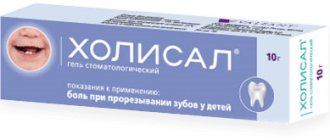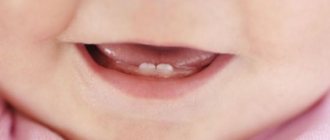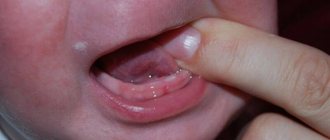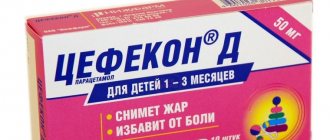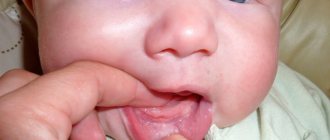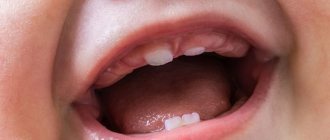Many people know what toothache is. Sometimes its intensity increases to such an extent that it is simply impossible to endure the torment. Often this problem occurs at night, when it is not possible to immediately go to the dentist. In this case, you have to use various painkillers and other medications. Previously, dental drops, which can be purchased at almost any pharmacy, were especially popular. Do they really help relieve pain?
What kind of drug is this and how does it work?
Several types of drops are used in dentistry - for teething, for inflammation (for example, gingivitis or periodontitis1), as well as for toothache. In today’s material we will talk specifically about those that relieve pain in the teeth when they hurt.
Drops are used to eliminate pain in the teeth
It is important to know! The product is intended for temporary pain relief if a person is currently unable to visit the clinic - for example, if the pain began in the evening or at night, on weekends or on holidays.
Dental pain drops are taken differently from tablets - i.e. not inside, but outside. To be more precise, the product is applied to the tooth and acts through its surface, and not through the circulatory system. By the way, in addition to relieving pain, the solution for topical use has a locally irritating or “distracting” effect, sedative (calming) and antiseptic properties.
Types of dental drops
Dental drops are produced by several pharmaceutical companies located in Tula, Yaroslavl and Ivanovo. Basically, all products produced have a similar composition and differ only in name. The composition of the medicine for the relief of toothaches usually includes: camphor oil (disinfects the oral cavity and prevents infection of soft tissues and neighboring teeth); peppermint oil (cools the gums, thereby reducing their pain, relieves swelling during gingivitis and periodontitis); valerian tincture (has a sedative effect on the body, reduces the severity of inflammation).
Drops are sold in pharmacies in bottles of 10-100 ml. Each bottle is equipped with a pipette for precise application of the drug to the problem area. How much do the drops cost? The average price of a medicine is from 15 to 40 rubles.
Below we will consider the best drops that help eliminate toothache without harm to health:
- Phytodent. The product consists of natural ingredients such as calamus, calendula and chamomile.
- Denta. The drug is suitable for eliminating severe pain associated with pulpitis and deep caries.
- Dentinox. The drops contain lidocaine and are suitable for use during teething in infants.
- Stomagol. The medicine is used to relieve discomfort associated with infectious diseases of the oral cavity.
- Dantinorm. Used to alleviate the condition of the child during the formation of the primary occlusion.
Dantinorm - drops for teething in children
All of the above remedies provide only temporary pain relief. Only a doctor in a clinical setting can cope with the cause of the pathology. In any case, dental drops are not a panacea for the problem.
What's included
The composition of the product consists of only three active ingredients, familiar to almost every person. This includes the following components:
- peppermint leaf oil,
- tincture of medicinal valerian,
- camphor (but not natural, but synthetic).
The drug has plant components.
Most of the mass of the transparent solution is occupied by natural plant substances, which give it a reddish-brown color and a specific smell. The drug is packaged in dark glass bottles of 10-15 ml.
What are they made of?
The main advantage of these drops is that they consist only of natural ingredients. Today there are many variations of drops, but the base is almost always the same:
- Camphor extract. Destroys pathogenic microorganisms in the oral cavity, fights the inflammatory process.
- Valerian. Has a mild sedative and analgesic effect.
- Peppermint. It dampens pain and has a natural antibacterial effect.
- Glycerol. Necessary to create a slight viscosity.
Additionally, additional ingredients may be present.
Can it be used in children?
Manufacturers indicate that toothache drops are indicated only for adults and children over 12 years of age. Moreover, from 12 to 18 years of age, the product should be used with caution. That is, for those children whose age has not yet reached 12 years, this drug is contraindicated - and you need to look for alternatives (for example, tablets and syrups based on ibuprofen or paracetamol).
The use of the drug is contraindicated for children under 12 years of age.
On a note! Children's drops can be used from a very early age - but only if this remedy is not for pain in the tooth itself, but during its eruption. Such drugs include, for example, the “Dantinorm Baby” or “Dentinox” solution.
Drop substitutes
If there are no drugs at hand that can relieve toothache, then you can turn to traditional medicine. One of the effective methods is saline or soda solution. In order to relieve pain, you need 1 tsp. dissolve one or another substance in 1 glass of water. Rinse your mouth with the solution every 30 minutes until pain relieves. To make the solution work faster, you need to add 15 drops of ammonia to it.
Lard will help partially cope with toothache. To do this, just take a small piece of the product and apply it to the problem area. The pain will begin to subside after 5-10 minutes
Instructions for use and side effects
You can understand how to use dental drops by reading the brief instructions. Manufacturers recommend moistening a small cotton swab with 2-3 doses of the product (i.e. 2-3 drops) and applying it to the sore tooth. However, this technique does not help some patients; then it is advised to apply 2-3 doses of liquid on a cotton swab and lubricate the entire surface of the diseased tooth.
Manufacturers recommend moistening a small cotton swab
Interesting to know! How to use dental drops for toothache if there is a carious cavity in the tooth (in other words, a “hole”)? Here, experts recommend placing a cotton swab moistened with a solution into the desired cavity - this way the components of the drug will quickly penetrate to the source of pain.
Rules of application
To eliminate the discomfort associated with caries or pulpitis, you need to take dental drops according to the following scheme: a small piece of cotton wool is moistened in the solution and applied to the carious cavity for 5-10 minutes. After this time, the cotton wool is removed from the tooth and thrown away. If the integrity of the enamel is not compromised, then only the soft tissue around the problematic element is wiped with a swab.
For painful eruption of wisdom teeth in adults, the solution is used according to a different algorithm: a cotton swab dipped in the preparation is used to treat the inflamed gum or use it instead of a compress for 10-15 minutes.
For stomatitis, use an aqueous solution of dental drops. To do this, dissolve 10 drops of medicine in 200 ml of boiled water. Rinse your mouth with the prepared product for 1 minute. The mouth is treated in the same way in the presence of ulcers and erosions on the mucous membranes.
To eliminate signs of gingivitis, dental drops are added to tooth powder or toothpaste. After this, standard hygiene procedures are carried out.
The drug is sold in pharmacies without a doctor's prescription, as it has a minimal list of contraindications and side effects. A serious contraindication to the use of the drug is the presence of epileptic seizures, fainting and heart rhythm disturbances.
To get rid of swelling of the soft tissues of the mouth, which is observed against the background of dental problems, you need to take an antihistamine. For adults, Claritin, Suprastin are suitable, for children - Fenistil.
Pregnant
Toothache is quite common in pregnant women. The cause of this condition is hormonal imbalances and physiological changes in the body. The formation of the fetus requires a lot of calcium, and if the child does not get it from food, then he takes the necessary components from the mother. Because of this, pregnant women are more prone to developing caries and pulpitis. Untimely treated caries poses a threat not only to the woman, but also to the baby, since an infection from the oral cavity can spread throughout the body.
Many dental drops contain ethyl alcohol, which even in small doses can harm the fetus. Therefore, before using dental drops, a pregnant woman should consult a specialist.
For toothaches, pregnant women should not consume many types of potent drugs, as they can negatively affect the formation of the fetus. In this case, dentists recommend pain-relieving drops. The drug can also be used during lactation with the prior permission of the pediatrician and dentist.
For children
During the period of teething in children, it is better to give preference to gentle drugs to relieve unpleasant symptoms. Dental drops contain alcohol, so they are not recommended for use to relieve suffering in a baby. Alcohol can cause burning of the mucous membranes and their irritation. Before using any medicine for children, you should first consult with a specialist.
Instead of drops when teething, it is recommended to use special creams or ointments with a softer composition. The drugs are used 3 to 6 times a day, depending on the severity of pain symptoms. Medicines in the form of gels and creams are used for up to 3 years, as their use is more effective and safe.
Drops are more suitable for children over 3 years of age. They help relieve dental pain associated with caries. The disease often occurs in primary teeth, since they have more fragile and thinner enamel than the molars. Painkiller drops are allowed to be given to children only in emergency cases, for example, if going to the doctor in the near future is not possible.
Dental drops can be safely given to children over 12 years of age. There are practically no contraindications for use for this category of patients; the main thing is to follow all the rules outlined in the instructions for use.
Precautions and special instructions
Since the drug is prohibited for oral administration, because In this case, it may cause nausea or diarrhea, so it should be kept out of the reach of children. And it is better to use the product away from cats, who react strongly even to the smell of valerian.
Special instructions! The drug reduces concentration, therefore it is not recommended for people whose occupation involves traffic - road, rail, aviation, as well as with dangerous mechanisms, and working at heights.
People with allergies should use the drops with caution.
The presence of plant components in the composition can provoke allergies, especially if a person has a predisposition. Therefore, carefully monitor the body’s reaction - the appearance of a rash, itching, difficulty breathing (especially dangerous!) is a need to stop the drug and see a doctor immediately.
Operating principles
The effectiveness of dental drops is expressed in:
- calming or sedative effect;
- antiseptic effect;
- analgesic effect;
- anti-inflammatory and disinfectant effects.
The drops have not only an anesthetic, but also an anti-inflammatory effect
This is achieved due to the presence in the preparation of active components of plant origin, as well as alcohol, hydrochloride, lidocaine, salicylic acid, camphor and sometimes other substances.
Composition of drops
At the same time, there are no harmful substances that are contraindicated for pregnant women at any stage of pregnancy. That is why drops can be purchased without a doctor's prescription.
Dental drops have some advantages even over pain pills, which are usually used to relieve toothache.
Table. Differences between drops and tablets for pain
Dental drops | Pills |
| Fast analgesic effect | The need to wait for the effect to occur 30-60 minutes after taking the pill |
| Also has antiseptic and bactericidal effects | No antiseptic or bactericidal effects |
| The substances that make up the drops have a detrimental effect on the source of infection | The infection cannot be controlled with pills, they only stop its main symptom – pain |
| Not contraindicated for pregnant women | Most often contraindicated for pregnant women |
As a rule, the drops contain valerian tincture - it is their main component. Thanks to it, a calming effect occurs and pain is reduced.
Valerian officinalis
The bactericidal and antiseptic effects are provided by the camphor oil contained in the drops.
Camphor oil
Peppermint or other herbal ingredients help disinfect the oral cavity. It is thanks to disinfection that the development of infection can be stopped, and the microbes that caused it die.
Peppermint
Since the drops are applied to the surface of the diseased tooth, the active substances from them immediately react, penetrating into the site of inflammation instantly.
And, what is very important, such a drug is included in the category of the least dangerous drugs, and it is not dangerous during pregnancy.
Popular varieties and their names
Most manufacturers did not change the name of drugs for toothache, which became famous back in Soviet times. Products called “Dental drops” or “Dental drops” can be found in almost any pharmacy. The drug is also produced under the brand name “Dentaguttal”. The composition and concentration of active ingredients in all preparations are the same.
The production of anesthetic solutions is carried out by Russian laboratories - “Moscow Pharmaceutical Factory”, “Yaroslavl Pharmaceutical Factory”, “Ivanovo Pharmaceutical Factory”, “Samaramedprom”, “Tula Pharmaceutical Factory”. There are also several factories producing this product in the CIS countries.
What should not be done in case of acute toothache?
It is important to help yourself without creating serious complications. It is important to know what you are prohibited from doing when you have an acute toothache:
- do not heat the tooth or cheek. Warm compresses stimulate blood flow to the area where the problem is. Because of this, an entire row of teeth can be damaged. It is better to apply ice for a short time;
- avoid bed rest. It is better to endure toothache on your feet or take a half-sitting position. Then the patient will be more comfortable. When a person is horizontal, the blood flow to the tooth increases. The nerve endings in that place are already irritated, so in addition the pressure also increases, the pain intensifies. In case of night pain, it is better to sleep on high pillows.
Which is better - drops or tablets, important nuances of use
If we compare drops for toothache and painkillers, then a lot will depend on the initial condition of the tooth and the person’s pain threshold. Dental drops have a quick and effective effect if the “nerve” is preserved in the tooth - a neurovascular bundle in the internal cavity.
But if the tooth was once treated for pulpitis or periodontitis, and now the pain has returned, then tablets will be more effective. Since the dental nerve is no longer present, the drops simply will not work in this case.
In some cases, it is more advisable to use tablets
“I had a bad toothache during the May holidays; we were just visiting my grandmother outside the city - so there were no hospitals or pharmacies nearby. And my grandmother offered me dental drops (I had never even heard of these, but they, it turns out, are considered an old and proven remedy in our family!!) What’s great is that they really helped me “live” these days to the dentist. But my husband tried it a few weeks later and it didn’t work on him.”
Yulia R., 33 years old, review from woman.ru
How do they work?
The above components individually are not capable of leading to the desired result, but a complex of medicinal ingredients leads to a positive result. First of all, it is worth noting a decrease in the intensity of the inflammatory process. Active substances destroy microbes in the mouth, which are often the culprits of pain. Some components act on nerve endings, which leads to a reduction in pain.
Please note that this remedy cannot cure the cause of the pain. Dental treatment can only be performed by a dentist. Dental drops have a temporary effect, helping to cope with discomfort until you go to the doctor.
When is the best time for pregnant women to have their teeth treated?
If a woman took a responsible approach to pregnancy and had her teeth treated in advance, she still needs to visit the dentist regularly for preventive examinations. This will allow you to detect pathology at an early stage and use the safest treatment methods. When performing any dental procedure, not only the woman’s well-being matters, but also the duration of pregnancy. Each trimester has its own characteristics and risks that determine the choice of treatment method.
First trimester
1st trimester
– period
from 1 to 12 weeks
inclusive. At this time, the formation of organs and structures of the embryo occurs. The placenta does not yet protect the fetus well enough from external influences, and the woman’s body undergoes serious changes: hormonal, physiological, metabolic. Any interventions, including medications, can negatively affect the pregnancy process and the health of the baby.
If a pregnant woman has a toothache in the 1st trimester, treatment is carried out mainly using gentle methods
(ICON, ozone therapy, air abrasive method). For pulpitis, periodontitis, accompanied by acute pain and purulent discharge, local anesthesia based on articaine (Ultracaine, Melivastesin, Mepifrine, Skadonest) is used.
Second trimester
2nd trimester
– period
from 13 to 24 weeks
.
This is the safest time
for dental treatment, gum treatment, professional hygiene and other dental interventions. The tissues, organs, and systems of the fetus have already been formed; the placenta reliably protects the baby from external factors. All planned procedures are recommended to be performed during this period.
Third trimester
3rd trimester
– the period
from 25 weeks to childbirth
, quite difficult for a pregnant woman.
The stress on the body increases, the placenta becomes more susceptible to external factors. Treatment is carried out exclusively for acute conditions
that are dangerous for the mother and child. Planned procedures are postponed until the baby is born.
If there is a need for dental treatment in a pregnant woman, a new generation of anesthetics based on articaine is used. The components of these drugs do not penetrate the placental barrier, do not affect the uterine and placental blood flow, do not increase the tone of the uterus, and are safe for the expectant mother and child. An alternative to local anesthesia is treatment under sedation (during sleep).
What symptoms should you consult a doctor for?
Any acute inflammatory diseases of teeth and gums are subject to urgent treatment. Even the smallest carious cavity is a source of infection, potentially dangerous for the developing fetus. If a carious tooth is not treated in a timely manner, pulpitis and periodontitis may develop, accompanied by severe pain and other symptoms.
You should immediately go to the dentist if the following symptoms appear:
- tooth reaction to cold, hot, sweet;
- pain (sharp, aching, throbbing);
- bleeding gums;
- pain when biting, chewing;
- redness, swelling of the gums;
- bad breath;
- purulent discharge
Urgent help
necessary for injuries - fracture of the tooth root, chips, cracks of the coronal part, damage to the pulp.
In the normal course of pregnancy, in the absence of risk factors for the mother and fetus, treatment of emergency or potentially dangerous conditions is carried out at any stage (in any trimester). The main contraindication to treatment is the threat of miscarriage. Each trimester has its own characteristics that determine the choice of treatment method.


